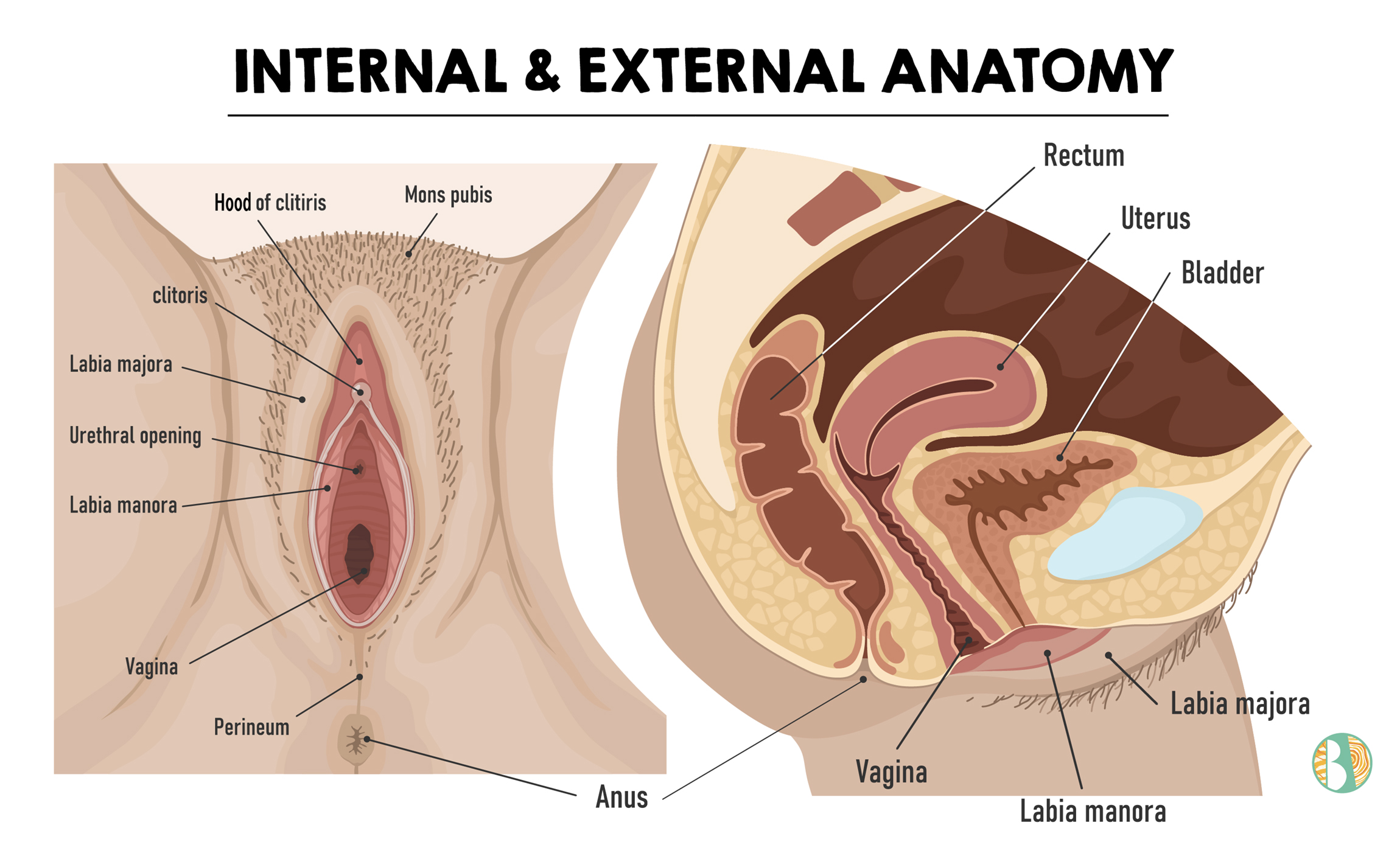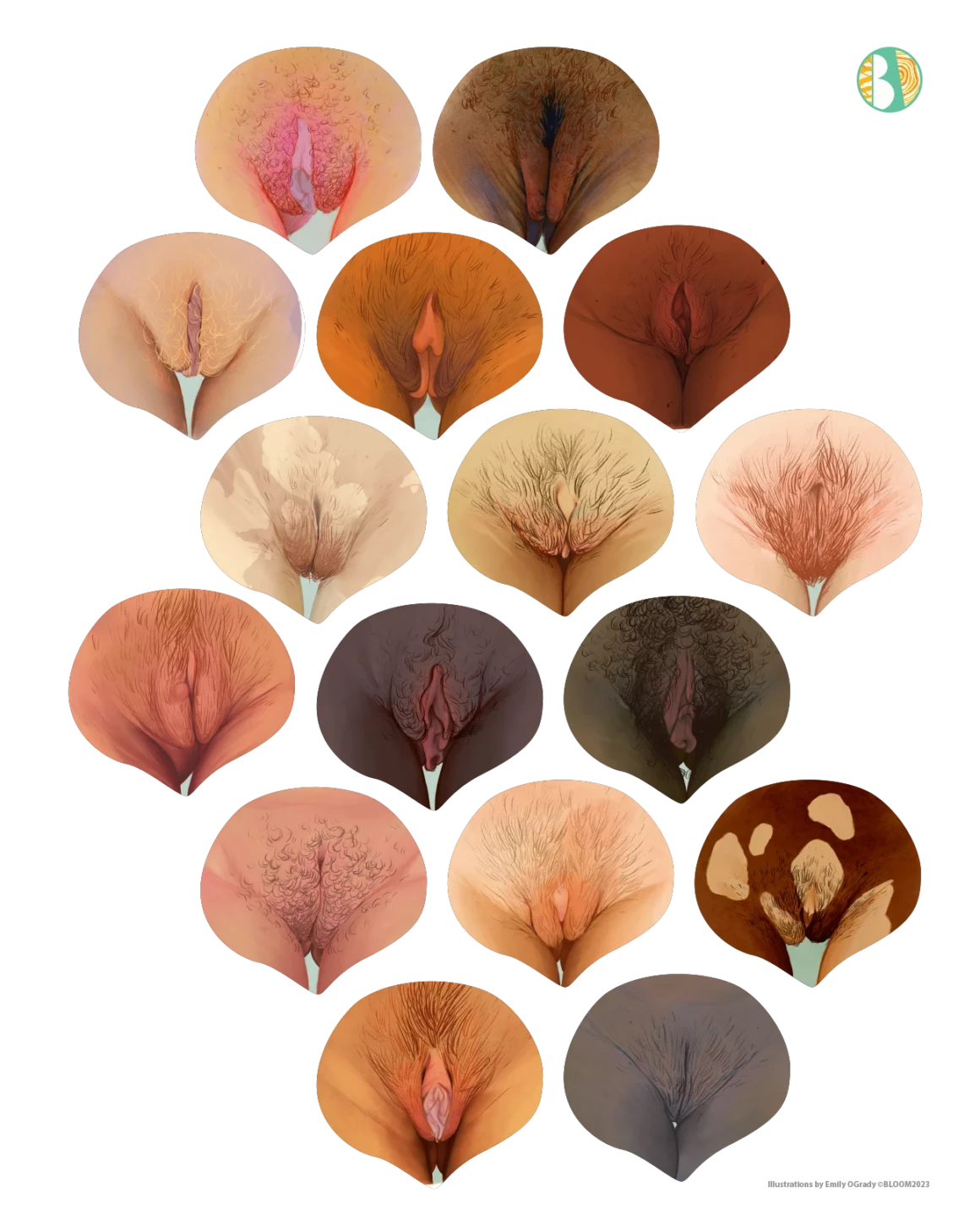Though sometimes mistaken for the vagina, the external female genitals are actually called the vulva. It is important for your young person, if they were assigned female at birth, to understand the different parts of their anatomy. Some preteens and teens may just be curious about why their body does certain things or even why their vagina has discharge.
Learn more about the vulva and the vagina, so you, as their caregiver, can support and answer their questions.
To learn more about penises and testes, check out our article here.
A Brief Guide of the External Parts: The Vulva
The vulva consists of two double folds of skin called the outer and the inner labia (or lips). The outer labia protects the inner labia and all the other parts. Between the lips, at the top, lies the head of the clitoris and the hood of the clitoris. Below it is the urethra, then the opening to the vagina, and some small glands that surround it.
Just above the vulva, toward the belly button, is the mons pubis, a fatty pad of skin that protects the pubic bone on the front of the body. During puberty, the skin of the outer labia and mons pubis begin to grow hair and may darken a bit in color. The inner labia does not grow hair, but may also darken during puberty.

A Brief Guide to the Internal Parts: The Vagina
The vagina begins at the vulva, extends inside the body three to four inches deep, and ends at the cervix (part of the uterus). Tiny openings around the entrance to the vagina secrete fluid that keep the inner labia moist. The amount of this fluid, as well as secretions from the vagina (vaginal discharge), may increase during puberty.
Helping Your Teen Accept Their Vulva and Vagina
Vulvas are completely unique; no two vulvas are alike, meaning that outer labias, inner labias, and clitorises will differ in size, length, and color from person to person. Vulvas can also change color as your young person gets older, or even change color and swell if they are aroused.
While our culture, media and pornography might spread outdated and harmful messages about how vulvas “should look,” this is completely incorrect. Remind your young person that these images of vulvas are unrealistic, and that diversity is beautiful, even as it applies to their vulva. Encourage them to celebrate their own uniqueness and explore their own body and get to know what feels good to them.
Certain influences in our culture, like media and pornography, for example, can spread some really outdated and harmful messages about how vulvas should look. These messages can make those who have vulvas feel self-conscious. If your young person has seen or heard these types of messages it may have a negative impact on their self-esteem. Remind your preteen or teen that diversity is beautiful, and we should celebrate our own uniqueness.

How to Care For Your Vulva
While your tween or teen is going through puberty, they might need extra support and education on how to care for their vulva, especially with all the changes. Here are 5 ways your preteen or teen can keep their vulva healthy.
Encourage Them to Wash Their Vulva Regularly
Washing their vulva is simple and can be done well with just a hand or a gentle washcloth, warm water, and a mild, fragrance-free soap (on the outer folds only). Make sure you let them know that they should also occasionally clean between the inner and outer lips (labia) to remove smegma — a normal substance the body makes that can lead to unpleasant odors if not rinsed away regularly.
Also, most natural scents come from sweat glands, which lie in the folds between the vulva, inner thighs and buttocks. Remind them to focus on cleaning these areas when they bathe. If they need help, Dr. Staci T, our Tik Tok Doc, explains how to wash your vulva.
Avoid Scented Products on Your Vulva and Vagina
Encourage your tween or teen to avoid scented products like shaving creams, scented soaps, vaginal hygiene sprays, and scented pads or pantiliners because they can irritate the vulva. Plus, these products are marketed to make natural body scents seem like a problem, and can make preteens and teens feel self-conscious about something that is completely natural, and that is problematic.
Change Underwear Daily
Encourage your teen or tween to change their underwear daily or soon after any activity that makes them sweat a lot. Wearing underwear made of cotton keeps the vulva dry and helps it breathe. Keeping on sweaty underwear, wet swimsuits, tights, leggings, tight pants, or jeans can be uncomfortable and lead to irritation or infections. At night, consider having them go without wearing underwear and/or wear pajama bottoms that are loose-fitting and allow their vulva to breathe.
Normalize Pubic Hair
Pubic hair provides protection to sensitive areas of the body. But, as hair begins to grow on the mons pubis and the vulva, some people feel pressure from peers, partners, or the media to shave or wax this area. It’s important to remember that hair grows here for a reason — to protect the vulva.
Let your teen or tween know that there is nothing wrong with letting the hair in this region grow naturally. If they want to groom their vulva, trimming the hair is safest. Waxing or shaving can cause small cuts or ingrown hairs that can lead to irritation or minor skin infections. Empower them to decide what is most comfortable when it comes to grooming their vulva area.
Reinforce Good Wiping Practices
Teach your teen to wipe front to back after bowel movements so that feces is moving away from the urethra and vagina. This will prevent any harmful bacteria from entering the body and causing an infection (e.g., UTI).
How to Perform a Self Exam of Their Vulva
In the same way your adolescent may examine their teeth, face, and body in the mirror or the shower, they should perform regular self-exams of their vulva. If they know what their vulva is like normally, they will be able to tell if something is different or new. Paying attention to the health of the vulva is just as important as keeping the rest of the body healthy.
Your preteen or teen can perform their own self-exam, here’s how:
- To perform a self-exam, they simply need to grab a hand mirror after a shower or bath, make sure they have good lighting, take a seat or lie down on their bed with their knees up/bent, open their legs, and view what they see.
- Using one hand, they should gently separate the folds of skin of the vulva and notice details like hair growth patterns and skin texture and shade (some parts will be darker brown or more pink than others).
Common Conditions That Affect Vulvas & Vaginas and Their Solutions
If they ever feel itching or burning on the vulva, notice bumps, or see rashes or redness when doing a self-exam, remind them not to panic. They should take a closer look and note the details; this will give them more information and help them communicate with you or their doctor about what they see. If they experience any of the following, it’s best to see a doctor.
Bumps or Rash on the Vulva
Bumps and rashes can be caused by simple things like a clogged follicle or ingrown hair, small cysts (fluid-filled pockets under the skin), a minor irritation from underwear, or a local heat rash (warmth + moisture + friction). Ask them to examine the bumps carefully, keep the area cool and dry, and speak with a medical professional if it persists or is uncomfortable.

Ready to elevate your parenting? Become a member of the BLOOM family today!
Gain access to workshops, coaching, and a network of supportive parents. Don’t navigate this journey alone –
Vaginal Itching
Itching on the vulva can be caused by a few things:
- Is the itch on the outside of the vulva, or the inside of the vagina? Some itching in the vulva area is normal since it’s warm, moist, and grows hair. Newly growing pubic hair can itch, as can pubic hair growing back after shaving.
- Vulvitis (i.e. an irritated vulva) can also cause itching, and can be caused by things like scented vaginal products.
- Normal monthly hormonal changes can also sometimes create temporary itching near the opening of the vagina, like just before or during a period.
If itching is a new symptom for your young person, have them first do a self-exam to get more information. They should look for any visual signs that could be causing the discomfort. Next, consider seeing a doctor, so a solution can be found sooner rather than later.
Burning With Urination
Burning with urination can be a sign of a Urinary Tract Infection (UTI). If your teen or tween has this symptom, start have them start drinking more water. They can also try taking cranberry tablets or drinking real cranberry juice (not a juice blend/drink and without added sugar), as these can help ease the symptoms that cause burning.
The burning can also be a sign of other issues, so see their doctor if the symptoms last more than a day or two.
BLOOM TIP > If your tween or teen feels uncomfortable talking to you about the things that are going on with their vulva or vagina, encourage them to read the information we have on the TEEN HUB and learn more about their vulva.

Vaginal Discharge
Vaginal discharge is normal, natural, and keeps the vagina clean and healthy. This discharge can be clear, white, slightly yellow, or if around their menstrual cycle, pink or brown.
Encourage your teen or tween to get to know what discharge is normal for them so if things change, they will be the first to know. If their discharge changes in color or odor and they also have any other symptom, there could be a mild infection.
For example, they might notice a change in discharge indicating they have a yeast infection. This can cause a thick, white cottage cheese-like discharge, itching, and irritation in the vagina. Yeast (candida) is a fungus that naturally grows in various parts of the body, including the vagina. It’s usually kept in check by good bacteria, but changing hormones, antibiotics, and other factors can sometimes throw things off balance. If they notice this, you can try an over-the-counter medication to clear it up, but it’s still a good idea to call or visit their doctor to get an accurate diagnosis.

Top Vulva & Vagina FAQs
Why Does it Smell Between the Leg and Thigh Areas?
Most of the scents between our legs come from sweat glands and may be affected by diet and hygiene. If your young person notices a scent that is new, stronger, or different than usual, especially if they also have itching or burning, they should talk with their doctor.
Why Does it Feel Wet in the Vulva Region?
Vaginas naturally produce discharge as well as lubrication for sexual activity. During puberty, it’s normal for this lubrication to increase just from thinking about something we find arousing. It just means that the body is working as it should. Wearing a pantiliner can help absorb some of this fluid if it is uncomfortable for your young person.
Why Do Dogs Like to Smell the Crotch Area?
Dogs like to smell everything; literally, everything, and crotches (on other dogs or on humans) are no exception. This area produces scents that are unique to each of us, so dogs sniff between the legs as a way to get to know each other as well as humans. It’s kind of their (odd to us) way of saying hello!
What Does the Word “Queef” Mean and Why Does it Happen?
A queef is a sound that is made when air trapped in the vagina is released suddenly. Different physical activities where the legs open and close suddenly or frequently can cause air to get trapped in the vagina. Later on, when stretching, bending over, or just relaxing, that air can come out and make a sound when it does.
What Is the Best Treatment for Razor Bumps?
If your young person chooses to shave or trim their pubic area and they experience bumps, irritation/redness, and/or ingrown hairs, this can be caused by razor burn or razor bumps. Have them try:
- Making sure to shave in the same direction that the hair grows
- Applying a cool compress to the area
- Moisturizing the area with one of BLOOM’s body care products
- Using a gentle scrub to release any ingrown hairs
- Giving it time, most razor bumps will resolve on their own
- Not shaving at all to get rid the problem for good
Parenting can leave you feeling overwhelmed and alone, but at BLOOM you have a community ready to help. Access Live and On-Demand Workshops featuring our trusted experts. Get answers to your pressing questions through our Ask the Expert Platform. Find strength by joining our Community Group and connecting with fellow parents and caregivers. If you need more tailored support, take advantage of our 1-on-1 Parent Coaching Sessions. Raising tweens and teens is hard, but with BLOOM by your side, you don’t have to do it alone.
